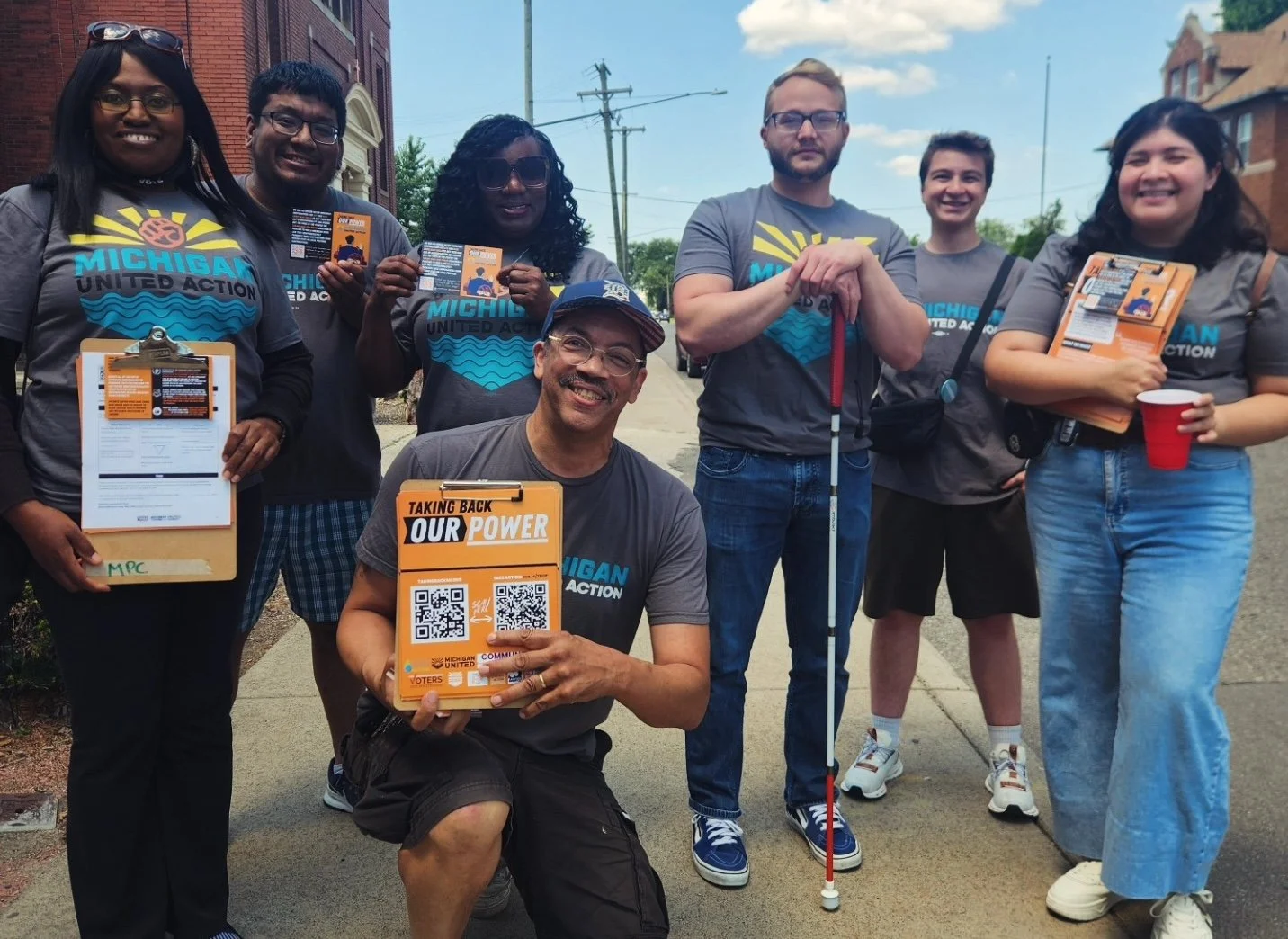In the Fight to Win MI-10, a Bellwether District, Organizing May Be Key
Canvassers from Michigan United Action, which is working to flip MI-10 this year.
Michigan’s 10th congressional district sits north of Detroit and includes large portions of Macomb County, which has been an important bellwether in American politics for decades. Steve James, Political Director of Michigan United Action, described Macomb as “rural,” “very working class,” and “UAW through and through.” It drew national attention when Ronald Reagan won here in 1980, thanks to the support of blue-collar voters who became known as “Reagan Democrats.” Macomb flipped again in recent elections — voting for Obama twice but for Trump in 2016 and again in 2020.
“In the past ten elections, in fact, Macomb County voters have chosen the winning candidate eight times, going back to the eighties,” James said, in a recent Blue Tent briefing. “So that's how important this county is.”
One Key to Defeating John James in MI-10: Showing Up
Michigan’s 10th district mostly consists of Macomb County, but also includes Rochester and Rochester Hills in neighboring Oakland County. The 2022 race in the district was extraordinarily close, with Republican John James defeating Democrat Carl Marlinga by less than 2,000 votes, or .5%. This year, with the right strategy, Michigan United Action believes that Democrats can flip MI-10 as part of a drive to regain control of the U.S. House.
A big part of that strategy is just showing up. According to Steve James, the Democratic Party hasn’t prioritized communities like those that makeup Michigan’s 10th district. He cited comments made by Chuck Schumer in 2016, when the Senator said, “For every blue-collar Democrat we lose in western Pennsylvania, we will pick up two moderate Republicans in the suburbs in Philadelphia. And you can repeat that in Ohio and Illinois and Wisconsin.”
Michigan United Action, a progressive statewide organizing group, is all about showing up. Flipping MI-10 — one of the most competitive districts in the country — is among its top priorities this year.
The work began in the 2022 election, when Michigan United attempted to talk to 70,000 Macomb county voters in MI-10 and had “20,000 difficult conversations with them about reproductive freedom, voting rights, local issues, racism, systemic oppression.”
“We went in hard, and we went in very intensely with these conversations,” said James. “And we came so close. It was so close.”
This time around, Michigan United Action plans to step up its efforts and talk to 90,000 MI-10 voters. To do that, James emphasized the importance of fundraising. “These are semi-rural voters. And it costs a lot more to reach them than it does in traditional organizing in big cities.”
James also noted that Republican incumbent John James is well-financed, thanks to connections made during a 2020 U.S. Senate run and in 2022. Like many others in the Republican Party, James has gone back and forth in his support for Donald Trump, having in late 2022 called the former president “unfit to lead,” only to turn around in July 2023 and endorse him.
How Grassroots Organizing Can Help Flip MI-10
Michigan United Action’s work to flip MI-10 entails training and supporting district organizers who can help win this year’s election and then stay in the fight over the long term to push for “systemic transformational change.”
One advantage that the group has is that its work isn’t contingent on the outcome of the Democratic primary election for MI-10, which will take place on August 6th. “Groups like ours can engage voters early without being tied to that candidate,” said James. “And we can start doing that electoral organizing work even while a primary goes on.”
“But,” he added. “To do that, we need a lot of money.”
The Democratic Party’s general election candidate in the district will be one of four candidates. Carl Marlinga is running again after his close defeat to John James in 2022; political outsider Emily Busch is running on a pro-gun control platform; Tiffany Tilley, a member of the Michigan Department of Education; and Diane Young, a financial planner from Warren in Macomb county. But whoever the candidate is, Steve James believes that flipping MI-10 will require a dedicated issues-based focus.
“Our organizing works because we focus on systemic change, not business as usual, politics, or transactional organizing.”
As such, a critical part of Michigan United Action’s organizing is its long-term vision, one built around reconnecting with the kinds of multiracial working-class voters the Democratic Party has taken for granted in the Midwest. 2024, then, is just the start.

